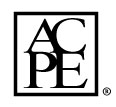|
|
ARB 337
|
ARB 406
|
ARB 469
|
|
SESSION 1
12:15 pm – 1:00 pm
|
Allison Hotop, Pharm.D.
Inpatient Use of Sleep Medications and the Importance of Sleep Hygiene |
Taylor Schumacher, Pharm.D.
DOAC Usage in Hospitalized Patients with Renal Impairment, CKD, and ESRD |
Allison Wicker, Pharm.D.
Antithrombotic Therapy Following Transcatheter Aortic Valve Replacement
|
|
1:00 pm – 1:05 pm
|
Break for Transition between Speakers
|
||
|
SESSION 2
1:05 pm – 1:50 pm
|
Karina Trac, Pharm.D.
Utilization of Intravenous Non-steroidal Anti-inflammatory Drugs |
Cameron Whitlock, Pharm.D.
Is There a Role of Direct Oral Anticoagulants in HIT? |
Rebecca Babalola, Pharm.D.
Is Low Level Viremia Predictive of Virologic Failure? |
Registration is free, but is required in advance. Due to limited space, only those participants who register before 5:00 PM on Friday, October 30, 2020 will be able to request parking access on campus.
PARKING: To request parking, please first register for your desired sessions. Then, complete the parking questionnaire using the link above, or complete your parking request by clicking here>>>. If you do not request parking on our campus, or if you do not submit your request by the deadline, you will be re-directed upon arrival.
ATTENDANCE: All live participants will be required to sign in on the paper sheets, located within each room. Paper sign-in sheets will be reconciled against completed evaluations. Attendance for the virtual sessions will be captured once a participant joins the session and will be reconciled with completed evaluations. Any sessions that you did not attend will be removed from your account within two weeks following the seminars.
CPE CREDIT: Immediately following the presentation, registered participants will receive an email with a link to the evaluation. Within one week after attending the session, participants must complete this online evaluation. The CPE Administrator will submit each participant’s NABP number and date of birth combination to CPE Monitor for continuing education credit, no later than two weeks after the live presentation. Only ONE session may be claimed for each time block. If multiple concurrent sessions are claimed, or if a session is claimed that is not reflected on the paper sign or the attendance roster within Microsoft Teams Meeting, the offending participant forfeits CE credit.
SPECIAL ACCOMMODATIONS
Attendees of all abilities are welcome to participate. If you require reasonable accommodations, please notify Nicole Fields via email at Nicole.Fields@uhsp.edu in advance so that she may secure resources as soon as possible. Every effort will be made to make accommodations where necessary.
Date: Nov 4, 2020 12:00 PM - 02:00 PM
Fee
CE Hours
Activity Type
- Knowledge
Objectives
- Identify the mechanism of action of common agents used for sleep/sedation
- Describe the difference between sleep and sedation
Speaker(s)/Author(s)
|
Allison Hotop, Pharm.D. |
Activity Number
0033-0000-20-064-L01-PCE Hours
Location
Speaker(s)/Author(s)
|
Taylor Schumacher, Pharm.D. |
Activity Number
0033-0000-20-061-L01-PCE Hours
Location
Objectives
- List the current guideline recommendations regarding antithrombotic therapy after transcatheter aortic valve replacement.
- Summarize emerging data regarding antithrombotic strategies post transcatheter aortic valve replacement.
Speaker(s)/Author(s)
|
Allison Wicker, Pharm.D. |
Activity Number
0033-0000-20-059-L01-PCE Hours
Location
Speaker(s)/Author(s)
|
Karina Trac, Pharm.D. |
Activity Number
0033-0000-20-060-L01-PCE Hours
Location
Objectives
- Identify risk factors associated with heparin-induced thrombocytopenia (HIT)
- Compare and contrast the dosing of different DOACs in heparin-induced thrombocytopenia
- Summarize recent literature regarding the use of direct oral anticoagulants (DOACs) in HIT
Speaker(s)/Author(s)
|
Cameron Whitlock, Pharm.D. |
Activity Number
0033-0000-20-063-L01-PCE Hours
Location
Speaker(s)/Author(s)
|
Rebecca Babalola, Pharm.D. |
